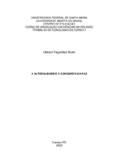| dc.contributor.advisor | Souza, Sandra Elisa Réquia | |
| dc.creator | Brum, Ubiraci Fagundes | |
| dc.date.accessioned | 2021-03-05T16:59:33Z | |
| dc.date.available | 2021-03-05T16:59:33Z | |
| dc.date.issued | 2020-12-01 | |
| dc.date.submitted | 2020 | |
| dc.identifier.uri | http://repositorio.ufsm.br/handle/1/20389 | |
| dc.description | Trabalho de conclusão de curso (graduação) - Universidade Federal de Santa Maria, Centro de Educação, RS, 2021 | por |
| dc.description.abstract | This paper aims to investigate the meaning of the notion of Alterity from the point of view of the teaching self-image of elementary school teachers. To approach the topic that is directly related to Religious Education, the research to be carried out will have a qualitative approach due to the discipline working with a universe of meanings, beliefs, values and attitudes, which correspond to a deeper space of relationships, of the phenomena that they cannot be reduced to the operationalization of results. As a source of research an autobiographical narrative of a teacher of elementary school. The approach to the theme, Alterity and the conquest of a society based on the principles of peace, has as a reference the answers to questions about the notion of the principle of teaching alterity. And how issues related to human diversity occur and are treated in the Teaching Institution. and the issues of the practice of intolerance underlying them. The research seeks to support, through theoretical assumptions, the relevance of the theme for the construction of a humanly sustainable society. That would be achieved through recognizing, valuing and welcoming the unique and diverse character of the human being; assign meaning to life through the "me" and the "other" and the us in a society. The school environment is a privileged space for providing students with the opportunity to reflect on themselves and the environment in which they live, their living space. Thus making their educators' understanding of the topic indispensable. Through the teacher's speech, it can be seen that this concept of Alterity is not introjected by the teachers. Making it necessary for educational institutions to include in their teaching projects. Understand that human rights ensure the exercise of citizenship by promoting a culture of peace. Religious education is an integral part of the basic education curriculum and helps students to build their personal meanings of life, based on values and ethical principles and citizenship. Making Alterity a key concept to be understood and aggregated. Thus, the school becomes a mediating institution for these conflicts in search of the dreamed society of peace. | eng |
| dc.language | por | por |
| dc.publisher | Universidade Federal de Santa Maria | por |
| dc.rights | Acesso Aberto | por |
| dc.rights | Attribution-NonCommercial-NoDerivatives 4.0 International | * |
| dc.rights.uri | http://creativecommons.org/licenses/by-nc-nd/4.0/ | * |
| dc.subject | Direitos humanos | por |
| dc.subject | Diversidade | por |
| dc.subject | Alteridade/ensino religioso | por |
| dc.subject | Acolhida | por |
| dc.subject | Human rights | eng |
| dc.subject | Diversity | eng |
| dc.subject | Welcoming | eng |
| dc.subject | Alterity/religious education | eng |
| dc.title | A alteralidade e a conquista da paz | por |
| dc.title.alternative | Alterality and peace achievement | eng |
| dc.type | Trabalho de Conclusão de Curso de Graduação | por |
| dc.degree.local | Polo de Cacequi, RS, Brasil | por |
| dc.degree.graduation | Ciências da Religião | por |
| dc.description.resumo | O presente trabalho tem por objetivo a pesquisar a significação da noção da Alteridade sob o ponto de vista da autoimagem docente dos professores do Ensino Fundamental. Para abordar o tema que faz relação direta com o Ensino Religioso, a pesquisa a ser realizada terá abordagem qualitativa devido a disciplina trabalhar com um universo de significados, crenças, valores e atitudes, que correspondam a um espaço mais profundo das relações, dos fenômenos que não podem ser reduzidos a operacionalização de resultados. Como fonte de pesquisa uma narrativa autobiográfica de uma professora do Ensino Fundamental. A abordagem do tema, A alteridade e a conquista de uma sociedade alicerçada pelos princípios da paz, tem como referência as respostas das indagações sobre a noção do princípio da alteridade docente. E como ocorrem e são tratados na Instituição de Ensino as questões relacionadas à diversidade humana. e as questões da prática da intolerância a elas subjacentes. A pesquisa busca alicerçar através de pressupostos teóricos a relevância do tema para a edificação de uma sociedade humanamente sustentável. Que seriam conquistadas através do reconhecer, valorizar e acolher o caráter singular e diverso do ser humano; atribuir significado a vida através do “eu” e o “outro” e o nós em uma sociedade. O ambiente escolar constitui espaço privilegiado por proporcionar aos educandos a oportunidade de refletir sobre si mesmo e o ambiente que estão inseridos, seu espaço vivencial. Tornando desta forma a compreensão sobre o tema por parte de seus educadores indispensável. Através da fala da professora pode-se observar que este conceito a Alteridade não esta introjectado por parte dos docentes. Fazendo-se necessário por parte das instituições formadoras incluírem em seus projetos de ensino. Compreender que os direitos humanos asseguram o exercício da cidadania promovendo a cultura da paz. O ensino Religioso parte integrante do currículo da formação básica contribui para que os educandos construam seus sentidos pessoais de vida, a partir de valores e princípios éticos e da cidadania. Fazendo da Alteridade conceito chave a ser compreendido e agregado. Assim sendo a escola torna-se uma instituição mediadora desses conflitos em busca da sonhada sociedade de paz. | por |
| dc.publisher.country | Brasil | por |
| dc.publisher.initials | UFSM | por |
| dc.subject.cnpq | CNPQ::CIENCIAS HUMANAS::TEOLOGIA | por |
| dc.publisher.unidade | Centro de Educação | por |



